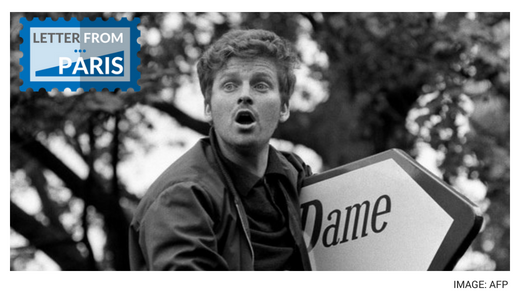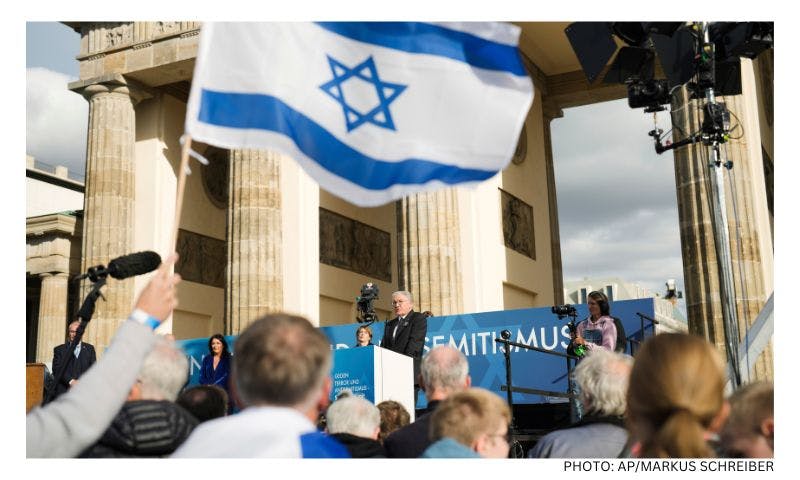Published: 16 May 2018
Last updated: 4 March 2024
He returned to France when he was 20, in 1965, first to study at the Sorbonne, then registering as a student of sociology at the newly founded Nanterre University, on the outskirts of Paris.
Known as Danny the Red (both for his shock of red hair and his far-Left politics), Cohn-Bendit was at the epicentre of the student rebellion which began with students at Nanterre demanding greater sexual freedoms, but escalated to become an epoch-defining general strike that shook the deeply conservative country to its core and permanently changed French society.
As the face of the student uprising, Cohn-Bendit came under vicious attack from various well-known figures, including President Charles de Gaulle himself, for being a foreigner, leading to one of the most famous slogans of May ‘68, “We are all German Jews!”
Although it was Cohn-Bendit who caught the public imagination, he was far from the only Jew among the leaders of the student revolution. Many young Jews born in France during or after World War II became members of Trotskyist, Maoist or anarchist groups, and were central figures in the revolutionary movements of the late 60s and early 70s. Indeed, of the student uprising’s four principal leaders, three were Jewish: Cohn-Bendit, Alain Krivine, and Alain Geismar.
Yair Auron, an Israeli historian of the Jewish participation in the French far Left of the 60s, suggests that this was no accident: he argues that it was the experience of growing up in families deeply marked both by the immigrant experience of the early twentieth century and by the Shoah in France that led so many young French Jews of the time to far-Left politics.
Auron suggests that it was the fact that so many Jews were at the head of the multiple movements that ensured that the far-Left never elected to adopt terrorism to further its cause, unlike in Germany and Italy.
Auron’s analysis of the importance of their Jewish experience - whether repressed or acknowledged – suggests that it came out of the fact that they tended to have had little sense of being deeply rooted in French culture and society and at the same time feeling no affinity with the Zionist movement and Israel.
But it is Auron’s conclusion that is most intriguing; he suggests that it was the fact that so many Jews were at the head of the multiple movements that made up the French far Left that ensured that the movement never elected to adopt terrorism to further its cause, unlike in Germany and Italy.
It is a tantalising, if unprovable, theory, which, if true, makes the Jewish contribution to France’s social revolution even more significant than is generally thought.
In mid-May 1968, when students and workers united to bring France to a standstill (11 million people, 20% of the entire population, went on strike for two weeks in May), it was another Jew, Henri Krasuki who represented the workers.
Born in Poland in 1924 into a Yiddish-speaking family of communist militants, Krasuki came to Paris with his parents in 1928. After the Germans occupied northern France in 1940, 16-year old Krasuki gave up his school studies to work full-time for the communist resistance, distributing tracts and attacking German military targets. Krasuki and his parents, Léa and Isaac (who since his arrival in France had become a union leader representing Jewish immigrant garment workers) were deported separately to Auschwitz in 1943. Only Léa and Krasuki survived.
In the 1950s Krasuki became a member of the French Communist Party’s central committee and a union leader. And it was in this role that he would go on to make history, as he joined the negotiations at the end of May 1968 that led to the signing of the Grenelle Agreement - which led to huge rises in pay and conditions for workers and eventually ended the crisis that threatened to bring down de Gaulle’s government.
As their parents, or more likely their grandparents, remember the original movement, French students all over the country are again occupying campuses in furious opposition to President Emmanuel Macron’s proposals to change the university application system.
Fifty years ago, students wanted to change everything; today they are striking largely to keep the system, antiquated and expensive as it is, unchanged. There is a febrile atmosphere in the air, as far-Left activists, whipped up by Jean-Luc Menlenchon, firebrand leader of La France Insoumise (France Unbowed) and presidential candidate in last year’s elections, gather in their thousands to call for Macron’s resignation in protest against reforms to the labyrinthine employment code and tax cuts that favour the better off.
The spectre of May ‘68 continues to haunt and divide France, as it will no doubt for many years to come.
RELATED
Israel and Australia more concerned with realpolitik than morals - NIKKI MARCZAK AND YAIR AURON
Photo: Daniel Cohn-Bendit leading a demonstration on May 13, 1968 (AFP)




